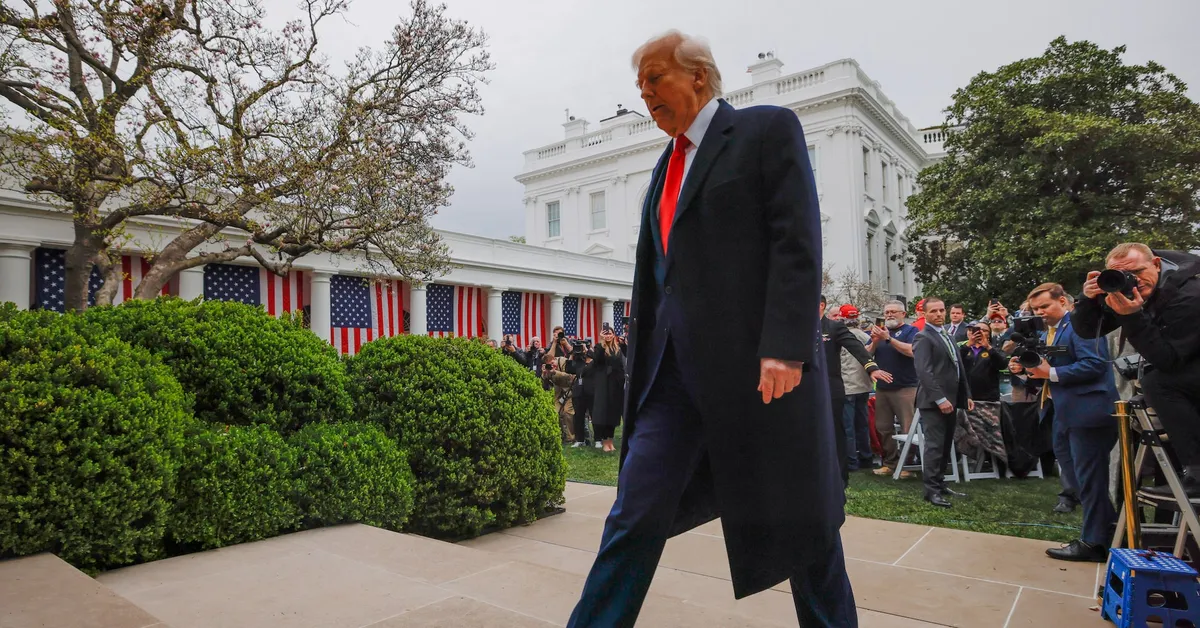
On April 3, 2023, President Donald Trump labeled the day as Liberation Day, unveiling a series of reciprocal tariffs that might stir significant political and economic challenges for his party. While Trump and his supporters believe these tariffs will reshape the U.S. economy and revitalize manufacturing within the country, experts caution that the anticipated benefits may take years to materialize. This delay could lead to higher prices for consumers and potential economic downturns, especially as the midterm elections approach.
The new tariffs, which could reach up to 34 percent on Chinese goods and 20 percent on European Union products, are projected to affect consumers directly. Economists argue that tariffs function as a tax on consumers, with a recent Reuters/Ipsos poll indicating that 70% of Americans, including 62% of Republicans, believe these increased tariffs will elevate the cost of essential goods such as groceries. Approximately 53% of respondents expressed that these tariffs would do more harm than good, raising concerns that the economic fallout could adversely affect the Republican party in the upcoming elections.
The political ramifications of Trump's tariff strategy could be severe. With narrow margins in both the House of Representatives and the Senate, a backlash from voters dissatisfied with rising prices could shift power to the Democrats if the midterms do not favor the Republicans. Mike Dubke, a former communications director for Trump, highlighted the potential for significant electoral pain if the anticipated benefits of the tariffs do not materialize within the next 18 months.
Public sentiment regarding tariffs is mixed, with only 31% of poll respondents believing that U.S. workers benefit from tariffs on imported goods. This skepticism underscores a broader concern regarding the economic strategy that Trump has adopted. Lanhee Chen, a fellow at the Hoover Institution, pointed out that the immediate risk posed by tariffs is a rise in prices and the potential for a recession, which contradicts Trump's initial promise to reduce living costs.
Following Trump's tariff announcement, U.S. stock futures plummeted, indicating a negative market response that could impact retirement savings for many Americans. This decline reflects broader concerns about the stability of the economy, especially as Trump positions these tariffs as a means to boost American businesses and reduce national debt. However, a former Republican congressional aide remarked that Liberation Day might be more about extracting money from American consumers than genuinely benefiting them.
The White House, attributing rising inflation to the previous administration, remains steadfast in its support for Trump's trade policies. Spokesman Kush Desai asserted that the administration's focus is on enhancing the welfare of the American populace rather than entertaining political hypotheticals. Conversely, Democrats are poised to leverage the economic implications of these tariffs against Republicans, especially given the backdrop of a recovering economy with low unemployment rates and moderate inflation.
Responses from small business owners reflect a divide in opinion regarding the tariffs. In Baltimore, Drew Greenblatt, who owns Marlin Steel, noted a positive impact on orders as customers increasingly opt for American-made products. In contrast, Michelle Lim Warner, a wine boutique owner in Washington, D.C., expressed concern about the affordability of imported wines, stating, "Who is going to pay $75 for what was a $25 bottle of wine?" This sentiment highlights the potential strain tariffs could place on consumer choices and spending.
As the U.S. navigates the complex landscape of international trade and domestic economic policy, the implications of Trump's tariffs loom large. With the potential for rising prices, voter dissatisfaction, and shifting political power, the coming months will be critical for both the economy and the Republican party. The outcome of these policies may ultimately shape the political landscape as the nation heads toward the midterm elections in 2024.